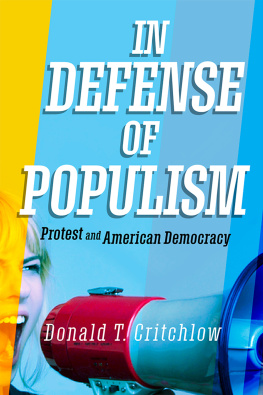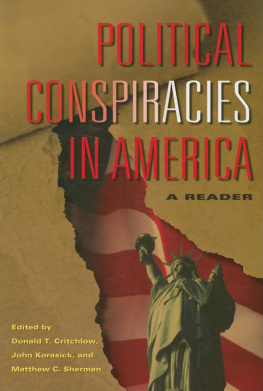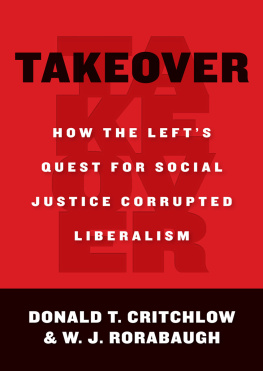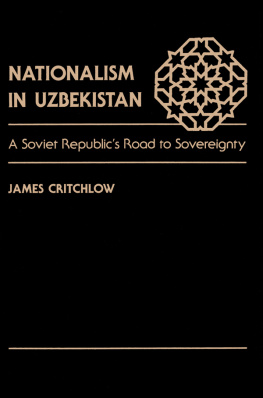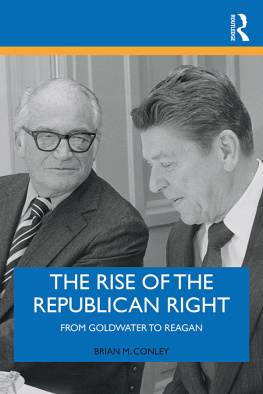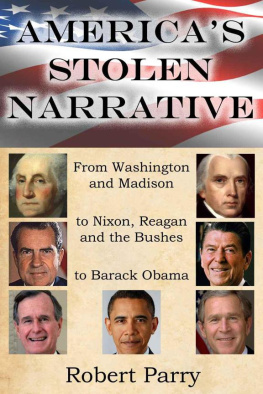Donald T. Critchlow - Republican Character: From Nixon to Reagan
Here you can read online Donald T. Critchlow - Republican Character: From Nixon to Reagan full text of the book (entire story) in english for free. Download pdf and epub, get meaning, cover and reviews about this ebook. year: 2018, publisher: University of Pennsylvania Press, genre: Politics. Description of the work, (preface) as well as reviews are available. Best literature library LitArk.com created for fans of good reading and offers a wide selection of genres:
Romance novel
Science fiction
Adventure
Detective
Science
History
Home and family
Prose
Art
Politics
Computer
Non-fiction
Religion
Business
Children
Humor
Choose a favorite category and find really read worthwhile books. Enjoy immersion in the world of imagination, feel the emotions of the characters or learn something new for yourself, make an fascinating discovery.

- Book:Republican Character: From Nixon to Reagan
- Author:
- Publisher:University of Pennsylvania Press
- Genre:
- Year:2018
- Rating:4 / 5
- Favourites:Add to favourites
- Your mark:
- 80
- 1
- 2
- 3
- 4
- 5
Republican Character: From Nixon to Reagan: summary, description and annotation
We offer to read an annotation, description, summary or preface (depends on what the author of the book "Republican Character: From Nixon to Reagan" wrote himself). If you haven't found the necessary information about the book — write in the comments, we will try to find it.
Donald T. Critchlow: author's other books
Who wrote Republican Character: From Nixon to Reagan? Find out the surname, the name of the author of the book and a list of all author's works by series.
Republican Character: From Nixon to Reagan — read online for free the complete book (whole text) full work
Below is the text of the book, divided by pages. System saving the place of the last page read, allows you to conveniently read the book "Republican Character: From Nixon to Reagan" online for free, without having to search again every time where you left off. Put a bookmark, and you can go to the page where you finished reading at any time.
Font size:
Interval:
Bookmark:
Republican Character
Character
From Nixon to Reagan
Donald T. Critchlow

A volume in the Haney Foundation Series, established in
1961 with the generous support of Dr. John Louis Haney.
Copyright 2018 University of Pennsylvania Press
All rights reserved. Except for brief quotations used for
purposes of review or scholarly citation, none of this book
may be reproduced in any form by any means without written
permission from the publisher.
Published by
University of Pennsylvania Press
Philadelphia, Pennsylvania 19104-4112
www.upenn.edu/pennpress
Printed in the United States of America on acid-free paper
10 9 8 7 6 5 4 3 2 1
Library of Congress Cataloging-in-Publication Data
Names: Critchlow, Donald T., author.
Title: Republican character : from Nixon to Reagan / Donald T. Critchlow.
Other titles: Haney Foundation series.
Description: 1st ed. | Philadelphia : University of Pennsylvania Press, [2018] | Series: Haney Foundation series | Includes bibliographical references and index.
Identifiers: LCCN 2017024329 | ISBN 978-0-8122-4977-4 (hardcover : alk. paper)
Subjects: LCSH: Republican Party (U.S.: 1854 ) | Presidential candidatesUnited StatesPsychological aspects. | United StatesPolitics and government20th century.
Classification: LCC JK2356 .C735 2018 | DDC
973.920092/2dc23
LC record available at https://lccn.loc.gov/2017024329
To Patricia E. Powers
Presidential Character, Politics, and Power
While American politics in the early twenty-first century has become increasingly ideological for many voters, this book looks back at the careers of four leading Republican presidential contendersRichard Nixon, Nelson Rockefeller, Barry Goldwater, and Ronald Reaganto show that the role of political calculation, character, and temperament mattered just as much as ideology in practice. Their story revises what has become a standard narrative that emphasizes the importance of ideology over all else in politics. Each of the contenders staked out positions as ideological standard bearers that appealed to their followers. A closer look at them, however, reveals that each also showed varying degrees of ideological malleability. In the practice of politics, these rivals formed uneasy alliances among themselves, motivated by political gain and not ideological consistency. Moreover, Nixon, Rockefeller, and Goldwater possessed temperamental flaws, albeit of different kinds, that proved destructive to fulfilling their ambitions, while Ronald Reagan revealed a temperament that allowed him to gain his partys nomination, win the election, and govern successfully. Fortune, of course, played a critical factor in the careers of these men, but character and temperament proved equally decisive in their ability to convince voters they stood for principle and had the leadership qualities necessary to govern in a democratic system premised on legislative compromise. If actual politics is about power, American political history should be more than a delineation of ideology and should incorporate a deeper exploration of the interplay between principle and practice in political life.
Underlying this tension between ideological principle and the practice of politics rests a more important understanding of what makes for successful political campaigns and governance in a democracy. Discerning the balance between ideological principle and pragmatic politics, especially in governance, presents a problem for both Republicans and Democrats, one that can be traced throughout American political history. This problem was particularly acute for Republicans in the postwar years because their party was often out of power, intensely divided by ideological factions, shaped regionally, and driven by a growing and conscious right wing. As a minority party, Republicans fought among themselves about how best to win the White House and become a majority party in the electorate.
It would be naveand wholly incorrectto argue that ideology plays no role in Republican politics; rather, ideological division runs throughout the partys presidential politics. This ideological divide was evident when New York governor Thomas Dewey defeated Robert Taft for the partys nomination in 1948, and then when Taft was once again defeated for the nomination by Dwight D. Eisenhower in 1952. Eisenhowers election to the presidency suppressed, to a large degree, conservative opposition within the party. Nixons foregone nomination in 1960 contained an outright factional war within the party, although when Nixon accommodated Nelson Rockefellers demands for strong civil rights and national defense planks, conservatives were bothered to the point of breaking with Nixon. A feeble attempt to nominate Barry Goldwater at the convention in 1960 was only quelled when Goldwater declined the nomination and told convention delegates that a unified party was needed to win the election for Richard Nixon. Full-scale war within the party erupted in 1964, symbolized in the contest between Nelson Rockefeller and Barry Goldwater for the partys presidential nomination. Goldwaters loss in a landslide vote to Lyndon Johnson only exacerbated party divisions. Richard Nixon stepped back onto the presidential stage in 1968, winning the GOP nomination by appealing to conservatives as one of their own, and convincing moderate and liberal Republicans that he was not a right-wing nut job.
Once in office, Nixon distanced himself from the right in his party. His resignation from office in the midst of the Watergate scandal again opened up ideological fissures within the party. Former California governor Ronald Reagan, who had replaced Goldwater as the hero of the grassroots right, stepped forward to challenge incumbent Republican president Gerald Ford for the 1976 nomination. Reagan failed to oust Ford, but in 1980 Reagan won the nomination, running as an avowed conservative. Reagans election to the White House marked a triumph for conservatives within the party, and after he left office, candidates running for the partys nomination had to declare themselves true to a set conservative agenda, at least until New York businessman Donald Trump won the nomination and the White House in 2016, running on a populist message.
While ideological argument was certainly apparent in presidential politics from Nixon through Reaganand remains so today with the Republican Partythe reality of politics led each of the major contenders for the GOP presidential nomination down strange paths often inconsistent and even contradictory to ideological proclamation. The four major rivals for the presidency in the post-Eisenhower yearsNixon, Rockefeller, Goldwater, and Reaganeach found themselves confronted by the constraints of ideology and the necessity of winning election, which meant weighing principle and opportunity, ideological dogma and political practice, purity and pragmatism. Any understanding of Republican presidential politics in these years must be understood as more than just an ideological battle.
The political maneuverings of Nixon, Rockefeller, Goldwater, and Reagan to win the White House show that the struggle to become president is about, above all things, politics. Politics is about winning elections, not simply ideological consistency. As these four rivals sought the White House, they confronted the political shoals of opportunism and principle. Striking the right balance between pragmatism and ideals reveals the character and temperament of each of these presidential contenders. The importance of character and temperament should never be underestimated in judging any candidate for office, but is essential to a president in office. The fundamental character of the president determines his or her ability to govern successfully.
Next pageFont size:
Interval:
Bookmark:
Similar books «Republican Character: From Nixon to Reagan»
Look at similar books to Republican Character: From Nixon to Reagan. We have selected literature similar in name and meaning in the hope of providing readers with more options to find new, interesting, not yet read works.
Discussion, reviews of the book Republican Character: From Nixon to Reagan and just readers' own opinions. Leave your comments, write what you think about the work, its meaning or the main characters. Specify what exactly you liked and what you didn't like, and why you think so.

